单词讲解
必修三UNIT3 diverse cultures 单词知识点讲解

and then he went abroad to ____t_ry_h_is_f_o_rt_un_e_____(碰运 气).
创意课堂 点面突破
[小情境写作] (4)我被选中代表我们学校参加英语辩论比赛,因为我精通英语口语。
I’ve_b_ee_n__se_l_ec_t_ed__to__re_p_re_se(rnetpresent) our school to take part in the English debate competition because I have a good command of spoken English.
创意课堂 点面突破
[翻译]得知你已被一所重点大学录取,我写信祝贺你。 Learning that you have been admitted into a key university, I am writing to congratulate you.
4. occur vi. 发生;出现 (occurred; occurring)
[写美]——完成句子 (4)我很幸运能拥有一个足够体贴的妈妈帮助我渡过难关。 I _a_m__f_o_rt_u_n_a_te__to__h_a_v_e_a__th_o_u_g_h_t_f_u_l _e_n_o_u_g_h_m__o_m____ to carry me through the hard times.
10. escape n.逃跑;逃脱;解脱
vi.& vt.逃走;逃脱;避开;被忘掉;被忽视
创意课堂 点面突破
[练通]——单句语法填空 (1)I am specially writing to you to seek ____a_ft_e_r/_fo_r___ your suggestions on building a SpokenEnglish classroom.
高中英语必修1单词讲解
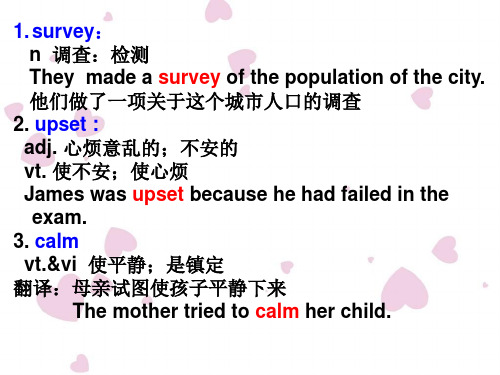
His partner was concerned about him very much. She understood exactly what he was suffering from, but entirely disagreed with his idea. In order to calm him down and settle his problem, she talked with him face to face and swapped a series of learning tips with him. The items she set down helped him find the highway to studying English well. The teenager was grateful and got great power from his friend’s words. Now, he has recovered from being upset and has fallen in love with English.
18.grateful adj. 感激的,表示谢意的 be grateful to 对…感激 Eg: 我们非常感激你对我们的帮助 we are very grateful to you for your help.
1. Fall in Love with English爱上英语
Hiding behind the loose dusty curtain, a teenager packed up his overcoat into the suitcase. He planned to leave home at dusk though there was thunder and lightning outdoors. He had got to do this because he was tired of his parents’ nagging( 唠叨) about his English study and did not want to go through it any longer. He couldn’t get along well with English and disliked joining in English classes because he thought his teacher ignored him on purpose. As a result, his score in each exam never added up to over 60.
高中英语必修2第5单元重点单词及短语讲解

必修2第5单元重点单词及短语讲解1.classical/classic1).classical adj.古典的,古典文学的2).classic adj. 经典的,classic music 是“经典的音乐”。
classical music 是“古典音乐”。
I don't like classical music very much.“经典的音乐”的所谓经典,意思是最好的,绝妙的,甚至流芳百世的。
Classic“经典的”不仅可形容音乐,也可以形容其他东西。
我们有时候说,“这句名言真经典!”就是这意思。
2.rollv. 滚动;摇摆;摇晃; n.. 面包圈卷型物roll out 碾平;铺开;动身;离开roll up本义:集结,袅袅上升, 卷起, 到达, 出现, 积累成Roll up! Roll up! Second performance now beginning!快来呀!快来呀!第二场演出又开始了。
Roll up, roll up, to see the lions.进来,进来,看看大狮子。
rock-and-roll= rock music=rock ‘n’roll摇滚乐, 摇滚舞3.folkn. folk作名词有:“父老乡亲,父母”的意思,还有“人们”的意思在英国英语语法里,folk以单数形式做集合名词用;在美国英语中常用folks,也没有错误。
But he wanted to see the old folk again and to visit my mother's grave.(《新概念英语第三册》57课第11行)Adj. 民间的Folk custom民俗 folk dance民间舞蹈 folk hero民族英雄 folk music民间音乐 folk singer民间歌手*** a knife and a fork和 a knife and fork 的区别?用法?一个说的是一副刀叉(a knife and fork ),另一个说的是一把刀和一把叉(a knife and a fork).如果是a knife and fork作主语,谓语动词用单数.(因为一副刀叉表示的是一个整体.)如果是a knife and a fork作主语,谓语动词用复数.(一把刀和一把叉表示的是两样不同的东西.当然要用复数喽.)4.be honest withbe honest with对...说老实话, 同...规规矩矩来往Talk with you. be silent with you. be honest with you和你谈话,陪你沉默,对你忠诚5.formn.形状;外貌;形体She has a tall graceful form. 她有着高大优雅的外形。
三年级上英语单词讲解

三年级上英语单词讲解
三年级上册的英语单词讲解主要包括以下几个方面:
基础单词:例如apple(苹果)、banana(香蕉)、cat(猫)、dog(狗)等,这些单词是英语中最基础、最常见的词汇,对于初学者来说非常重要。
颜色单词:例如red(红色)、blue(蓝色)、green(绿色)、yellow(黄色)等,这些单词描述颜色的基础词汇,对于帮助学生建立色彩感知和语言表达能力非常有帮助。
数字单词:例如one(一)、two(二)、three(三)、four(四)等,这些单词是学习英语计数的基础,有助于培养学生的数学思维和语言表达能力。
方向单词:例如up(上)、down(下)、left(左)、right(右)等,这些单词描述方向的基础词汇,对于培养学生的空间感和语言表达能力非常有帮助。
动物单词:例如tiger(老虎)、lion(狮子)、elephant(大象)、giraffe(长颈鹿)等,这些单词描述动物的常见词汇,对于培养学生的观察力和语言表达能力非常有帮助。
在讲解这些单词时,教师可以结合实物、图片和视频等多种形式,帮助学生理解单词的意义,并加强记忆。
同时,还可以通过游戏、歌曲等形式,激发学生的学习兴趣和积极性,提高学习效果。
单词讲解
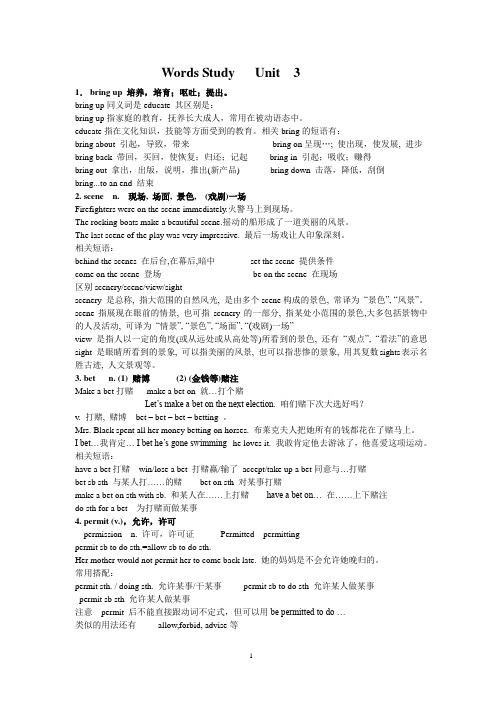
Words Study Unit 31.bring up 培养,培育;呕吐;提出。
bring up同义词是educate 其区别是:bring up指家庭的教育,抚养长大成人,常用在被动语态中。
educate指在文化知识,技能等方面受到的教育。
相关bring的短语有:bring about 引起,导致,带来bring on呈现…; 使出现,使发展, 进步bring back 带回,买回,使恢复;归还;记起bring in 引起;吸收;赚得bring out 拿出,出版,说明,推出(新产品) bring down 击落,降低,刮倒bring...to an end 结束2. scene n. 现场, 场面, 景色, (戏剧)一场Firefighters were on the scene immediately.火警马上到现场。
The rocking boats make a beautiful scene.摇动的船形成了一道美丽的风景。
The last scene of the play was very impressive. 最后一场戏让人印象深刻。
相关短语:behind the scenes 在后台,在幕后,暗中set the scene 提供条件come on the scene 登场be on the scene 在现场区别scenery/scene/view/sightscenery 是总称, 指大范围的自然风光, 是由多个scene构成的景色, 常译为“景色”, “风景”。
scene指展现在眼前的情景, 也可指scenery的一部分, 指某处小范围的景色,大多包括景物中的人及活动, 可译为“情景”, “景色”, “场面”, “(戏剧)一场”view是指人以一定的角度(或从远处或从高处等)所看到的景色, 还有“观点”, “看法”的意思sight 是眼睛所看到的景象, 可以指美丽的风景, 也可以指悲惨的景象, 用其复数sights表示名胜古迹, 人文景观等。
单词讲解

第一单元单词讲解1. survive a. vt &vi幸免于难,幸存;生还;挺过,艰难度过eg: Few ancient buildings still survive because of fire and battles.火灾和战争,很少有古代建筑保存下来。
There are concerns that the people may not survive the severe winter.人们担心这些人熬不过严冬。
b. vt比……长寿,比……活得长eg: Most wives survived their husbands. 妻子大都比她们的丈夫长寿。
知识拓展:a. survived n.[U]存活;[C]存留下来的人或东西Survive n.[C]幸存者,生还者b. survive on (尤指少量的钱、食物、水等)维持生计2. in search of 为固定短语,意为“寻找=(=searching for)”,常用作状语表示目的,也可用作表语,of后可接表示人或物的名词。
eg : The boys went in search of something to eat.男孩子们寻找吃的东西去了。
知识拓展:①当search前有the或one’s修饰时,其后常接介词for,即in one’s/the search for. eg: I harvest a lot in my search for knowledge. 在对知识的探求中我收获了很多。
②search vt &vi.Search sb./a place (for…)搜身/搜查某个地方(找……)Search for sb./sth.搜索,搜寻人或某物eg: The police searched the house for the stolen jewelry.警察搜查了那间房屋,以便找到被偷的珠宝。
He searched through all the drawers for the key. 他翻遍了所有的抽屉找钥匙。
高一必修一英语单词讲解
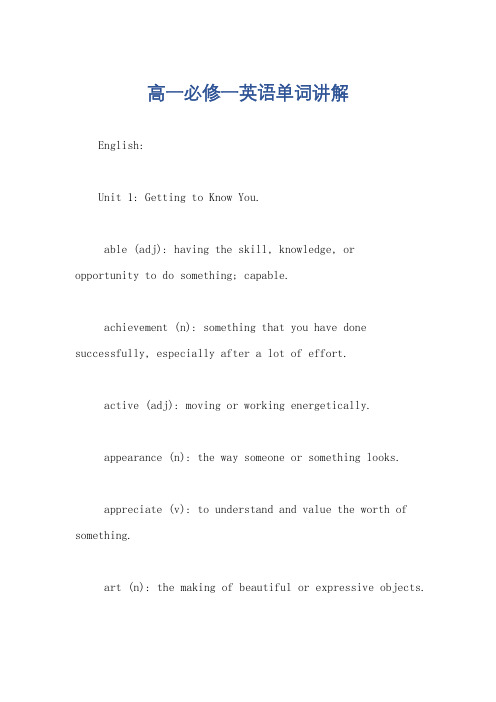
高一必修一英语单词讲解English:Unit 1: Getting to Know You.able (adj): having the skill, knowledge, oropportunity to do something; capable.achievement (n): something that you have done successfully, especially after a lot of effort.active (adj): moving or working energetically.appearance (n): the way someone or something looks.appreciate (v): to understand and value the worth of something.art (n): the making of beautiful or expressive objects.ask (v): to request information or an action from someone.attitude (n): a way of thinking or feeling about someone or something.beautiful (adj): pleasing to the senses, especially to the sight.behavior (n): the way someone acts or behaves.belong to (v): to be a member of a group or organization.birth (n): the time when a baby is born.brother (n): a male sibling.can (v): to be able to do something.care about (v): to be concerned or interested in someone or something.characteristic (n): a distinguishing quality or trait.class (n): a group of students who are taught together.clever (adj): intelligent and quick-witted.color (n): the property of light that gives the appearance of different shades.come from (v): to have a particular origin or background.community (n): a group of people living together inthe same area and sharing the same interests.compare (v): to examine two or more things to see how they are different or similar.complain (v): to express dissatisfaction about something.computer (n): an electronic device that processes and stores data.confident (adj): having a strong belief in oneself and one's abilities.consider (v): to think about something carefully.country (n): a political entity that has its own government and territory.creative (adj): having the ability to produce new and original ideas.culture (n): the beliefs, customs, and arts of a particular society.Unit 2: The World Around Us.adapt (v): to change to fit a new situation or environment.adventure (n): an exciting or unusual experience.affect (v): to have an effect on someone or something.air (n): the mixture of gases that surrounds the Earth.amazing (adj): causing great surprise or wonder.ancestor (n): someone from whom you are descended.animal (n): a living organism that is not a plant.atmosphere (n): the layer of gases that surrounds a planet or moon.attract (v): to draw someone or something towards youor another thing.average (adj): typical or ordinary.baby (n): a young child, especially one who is less than one year old.background (n): the place or circumstances in which someone grew up or lived in the past.behavior (n): the way someone acts or behaves.belief (n): something that you believe to be true or right.belong to (v): to be a member of a group or organization.birth (n): the time when a baby is born.brother (n): a male sibling.can (v): to be able to do something.care about (v): to be concerned or interested in someone or something.characteristic (n): a distinguishing quality or trait.class (n): a group of students who are taught together.clever (adj): intelligent and quick-witted.color (n): the property of light that gives the appearance of different shades.come from (v): to have a particular origin or background.community (n): a group of people living together inthe same area and sharing the same interests.compare (v): to examine two or more things to see how they are different or similar.complain (v): to express dissatisfaction about something.computer (n): an electronic device that processes and stores data.confident (adj): having a strong belief in oneself and one's abilities.consider (v): to think about something carefully.country (n): a political entity that has its own government and territory.creative (adj): having the ability to produce new and original ideas.culture (n): the beliefs, customs, and arts of a particular society.中文回答:单元 1,认识你。
人教版九年级英语单词讲解

人教版九年级英语单词讲解Unit 1.textbook [ˈtekstbʊk] n. 教科书;课本。
conversation [ˌkɒnvəˈseɪʃn] n. 交谈;谈话。
aloud [əˈlaʊd] adv. 大声地;出声地。
pronunciation [prəˌnʌnsiˈeɪʃn] n. 发音;读音。
sentence [ˈsentəns] n. 句子。
patient [ˈpeɪʃnt] adj. 有耐心的 n. 病人。
expression [ɪkˈspreʃn] n. 表达(方式);表示。
discover [dɪˈskʌvə(r)] v. 发现;发觉。
secret [ˈsiːkrət] n. 秘密;秘诀 adj. 秘密的;保密的。
look up (在词典、参考书中或通过电脑)查阅;抬头看。
grammar [ˈɡræmə(r)] n. 语法。
repeat [rɪˈpiːt] v. 重复;重做。
note [nəʊt] n. 笔记;记录 v. 注意;指出。
pal [pæl] n. 朋友;伙伴。
physics [ˈfɪzɪks] n. 物理;物理学。
chemistry [ˈkemɪstri] n. 化学。
memorize [ˈmeməraɪz] v. 记忆;记住。
pattern [ˈpætn] n. 模式;方式。
Unit 2.lantern [ˈlæntən] n. 灯笼。
stranger [ˈstreɪndʒə(r)] n. 陌生人。
relative [ˈrelətɪv] n. 亲属;亲戚。
put on 增加(体重);发胖。
pound [paʊnd] n. 磅(重量单位);英镑(英国货币单位)folk [fəʊk] adj. 民间的;民俗的。
goddess [ˈɡɒdes] n. 女神。
whoever [huːˈevə(r)] pron. 无论谁;不管什么人。
九年级英语单词讲解
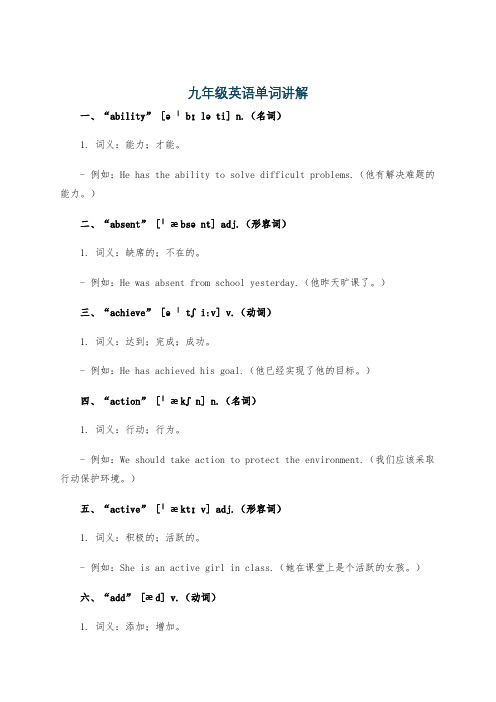
九年级英语单词讲解一、“ability” [əˈbɪləti] n.(名词)1. 词义:能力;才能。
- 例如:He has the ability to solve difficult problems.(他有解决难题的能力。
)二、“absent” [ˈæbsənt] adj.(形容词)1. 词义:缺席的;不在的。
- 例如:He was absent from school yesterday.(他昨天旷课了。
)三、“achieve” [əˈtʃi:v] v.(动词)1. 词义:达到;完成;成功。
- 例如:He has achieved his goal.(他已经实现了他的目标。
)四、“action” [ˈækʃn] n.(名词)1. 词义:行动;行为。
- 例如:We should take action to protect the environment.(我们应该采取行动保护环境。
)五、“active” [ˈæktɪv] adj.(形容词)1. 词义:积极的;活跃的。
- 例如:She is an active girl in class.(她在课堂上是个活跃的女孩。
)六、“add” [æd] v.(动词)1. 词义:添加;增加。
- 例如:Add some salt to the soup.(往汤里加些盐。
)七、“address” [əˈdres] n.(名词)/v.(动词)1. 作为名词:地址。
- 例如:Please write down your address.(请写下你的地址。
)2. 作为动词:演说;向……说话。
- 例如:He will address the meeting tomorrow.(他明天将在会议上发言。
)八、“advantage” [ədˈvɑ:ntɪdʒ] n.(名词)1. 词义:优点;优势。
- 例如:His height gives him an advantage in basketball.(他的身高在篮球方面给他一个优势。
六年级英语单词讲解
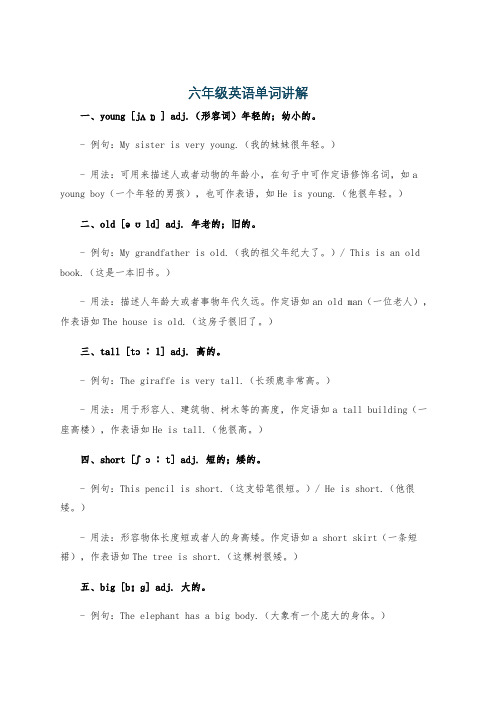
六年级英语单词讲解一、young [jʌŋ] adj.(形容词)年轻的;幼小的。
- 例句:My sister is very young.(我的妹妹很年轻。
)- 用法:可用来描述人或者动物的年龄小,在句子中可作定语修饰名词,如a young boy(一个年轻的男孩),也可作表语,如He is young.(他很年轻。
)二、old [əʊld] adj. 年老的;旧的。
- 例句:My grandfather is old.(我的祖父年纪大了。
)/ This is an old book.(这是一本旧书。
)- 用法:描述人年龄大或者事物年代久远。
作定语如an old man(一位老人),作表语如The house is old.(这房子很旧了。
)三、tall [tɔːl] adj. 高的。
- 例句:The giraffe is very tall.(长颈鹿非常高。
)- 用法:用于形容人、建筑物、树木等的高度,作定语如a tall building(一座高楼),作表语如He is tall.(他很高。
)四、short [ʃɔːt] adj. 短的;矮的。
- 例句:This pencil is short.(这支铅笔很短。
)/ He is short.(他很矮。
)- 用法:形容物体长度短或者人的身高矮。
作定语如a short skirt(一条短裙),作表语如The tree is short.(这棵树很矮。
)五、big [bɪɡ] adj. 大的。
- 例句:The elephant has a big body.(大象有一个庞大的身体。
)- 用法:描述物体的规模、尺寸大,可作定语如a big city(一个大城市),作表语如The box is big.(这个盒子很大。
)六、small [smɔːl] adj. 小的。
- 例句:This cat is small.(这只猫很小。
)- 用法:与big相对,形容物体的规模、尺寸小,作定语如a small room(一个小房间),作表语如The ball is small.(这个球很小。
单词讲解方法

单词讲解方法
单词讲解的方法有很多,以下是一些建议:
1. 词根词缀法:通过词根和词缀的组合来讲解单词的构成和含义。
这种方法可以帮助学生们理解单词的构成和含义,并提高他们的词汇量。
2. 语境法:将单词放入具体的语境中讲解,让学生们理解单词的实际用法。
这种方法可以帮助学生们更好地理解单词的含义和用法,并提高他们的语言运用能力。
3. 联想记忆法:通过联想相关的图像、故事、场景等来帮助学生们记忆单词。
这种方法可以激发学生们的学习兴趣,并提高他们的记忆效果。
4. 造句法:通过造句来讲解单词的用法和搭配。
这种方法可以帮助学生们更好地理解单词的用法,并提高他们的语言运用能力。
5. 分类法:将单词按照不同的类别进行分类讲解,如动物、植物、食物等。
这种方法可以帮助学生们更好地理解单词的含义和用法,并提高他们的词汇量。
6. 近义词比较法:将近义词进行比较讲解,让学生们了解它们之间的区别和用法。
这种方法可以帮助学生们更好地理解单词的含义和用法,并提高他们的语言运用能力。
7. 反义词比较法:将反义词进行比较讲解,让学生们
了解它们之间的对立关系。
这种方法可以帮助学生们更好地理解单词的含义和用法,并提高他们的语言运用能力。
总之,单词讲解的方法有很多,可以根据不同的需求和目标选择合适的方法进行讲解。
同时,也需要结合实际情况进行调整和改进,以提高学生们的学习效果。
人教版英语必修一单词表资料讲解
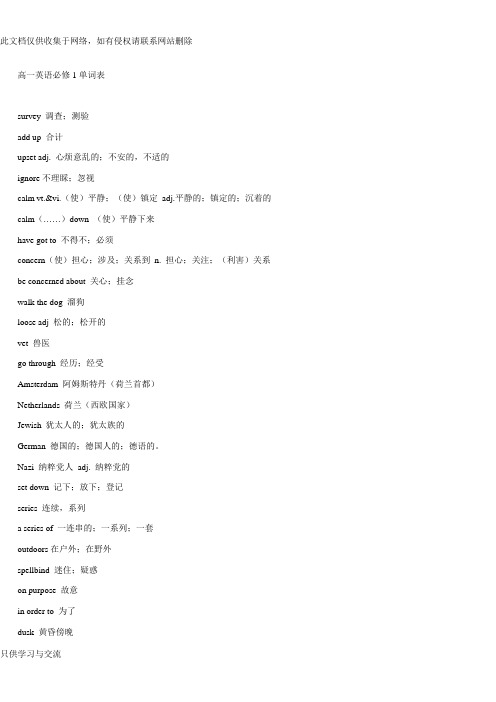
高一英语必修1单词表survey 调查;测验add up 合计upset adj. 心烦意乱的;不安的,不适的ignore不理睬;忽视calm vt.&vi.(使)平静;(使)镇定adj.平静的;镇定的;沉着的calm(……)down (使)平静下来have got to 不得不;必须concern(使)担心;涉及;关系到n. 担心;关注;(利害)关系be concerned about 关心;挂念walk the dog 溜狗loose adj 松的;松开的vet 兽医go through 经历;经受Amsterdam 阿姆斯特丹(荷兰首都)Netherlands 荷兰(西欧国家)Jewish 犹太人的;犹太族的German 德国的;德国人的;德语的。
Nazi 纳粹党人adj. 纳粹党的set down 记下;放下;登记series 连续,系列a series of 一连串的;一系列;一套outdoors在户外;在野外spellbind 迷住;疑惑on purpose 故意in order to 为了dusk 黄昏傍晚at dusk 在黄昏时刻thunder vi 打雷雷鸣n. 雷,雷声entire adj. 整个的;完全的;全部的entirely adv. 完全地;全然地;整个地power能力;力量;权力。
face to face 面对面地curtain 窗帘;门帘;幕布dusty adj 积满灰尘的no longer /not … any longer 不再partner 伙伴.合作者.合伙人settle 安家;定居;停留vt 使定居;安排;解决suffer vt &遭受;忍受经历suffer from 遭受;患病loneliness 孤单寂寞highway公路recover痊愈;恢复get/be tired of 对…厌烦pack捆扎;包装打行李n 小包;包裹pack (sth )up 将(东西)装箱打包suitcase手提箱;衣箱overcoat大衣外套teenager 十几岁的青少年get along with 与…相处。
单词讲解方法(一)

单词讲解方法- 语境法通过将单词放入特定语境中,帮助学生更好地理解和记忆单词的意义和用法。
这种方法能够让学生在实际语境中感受到单词的用法,从而更加深刻地理解和记忆单词。
例如,对于单词“apple”,可以让学生参与一个关于水果的对话,这样学生就能够在实际情境中理解“apple”这个单词的意思和用法。
- 联想法通过将单词与其他事物进行联想,帮助学生更加深刻地记忆单词。
这种方法能够让学生在大脑中形成单词与事物之间的联系,从而更加牢固地记忆单词。
例如,对于单词“happy”,可以让学生联想到自己或他人在得到好消息时的快乐表情,这样学生就能够更加深刻地记住这个单词。
- 词根词缀法通过讲解单词的词根和词缀,帮助学生理解和记忆单词。
这种方法能够让学生通过词根和词缀推断单词的意义,从而更加快速地掌握单词。
例如,对于单词“unbelievable”,可以讲解“un-”表示否定,而“-able”表示能够做某事,通过这样的讲解,学生就能够理解“unbelievable”表示不可信的意思。
- 图像法通过图像或图片来帮助学生记忆单词。
这种方法能够利用学生的视觉记忆,让学生更加直观地记忆单词。
例如,对于单词“dog”,可以向学生展示一张狗的图片,这样学生在记忆单词时就能够联想到这张图片,更加容易记住这个单词。
- 故事法通过讲解单词的故事或者编写一个故事来帮助学生记忆单词。
这种方法能够让学生将单词融入到一个有趣的故事情节当中,更加生动地记忆单词。
例如,对于单词“castle”,可以编写一个公主和王子在城堡中发生的故事,让学生通过这个故事来记忆“castle”这个单词。
- 歌曲法通过编写单词歌曲来帮助学生记忆单词。
这种方法能够利用学生的听觉记忆,让学生更加轻松地记忆单词。
例如,对于一些常用的单词,可以编写简单的歌曲来帮助学生记忆,这样学生在唱歌的过程中就能够轻松地记住这些单词。
通过以上不同的单词讲解方法,教师可以根据学生的实际情况和学习特点来选择合适的方法,帮助学生更加有效地记忆和掌握单词。
forth单词的讲解

forth单词的讲解
以下是"forth"单词的讲解:
"Forth"是一个英语单词,源自中世纪英语和古英语的"forth"。
它是一个副词,通常用于描述动作或状态的发展或进展。
例如,"he came forth from the room"意味着他从房间里走出来;"the ship came forth on the horizon"意味着船出现在地平线上。
此外,"forth"也可以用作动词,表示前进或向外移动。
例如,"the troops marched forth to the battlefield"意味着部队行进到战场。
此外,"forth"还可以表示"向外",如"the doors flew forth"意味着门被推开。
总的来说,"forth"是一个非常有用的单词,可以用于描述动作、状态和方向。
Unit 2 More than fun --单词表详细讲解

外研版七年级上册新教材(讲义)Unit 2 More than fun --单词表详细讲解rock music /rɒk `mjuːzɪk/ n. 摇滚乐复数形式:rock musics常用搭配:rock music festival (摇滚音乐节)classic rock music (经典摇滚乐)love for rock music (对摇滚乐的热爱)例句:I grew up listening to rock music. (我在摇滚乐中长大。
)as /əz/ prep. 像, 如同常用搭配:as usual (像往常一样)as if (仿佛,好像)as for (至于,关于)例句:He acted as though he didn't care. (他表现得好像他不在乎。
)electric /ɪˈlɛktrɪk/ adj. 用电的;电动的副词:electrically (用电地)常用搭配:electric guitar (电吉他)electric car (电动汽车)electric current (电流)例句:She drives an electric car to work. (她开电动汽车上班。
)guitar /ɡɪˈtɑː(r)/ n. 吉他复数形式:guitars常用搭配:acoustic guitar (原声吉他)play the guitar (弹吉他)guitar solo (吉他独奏)例句:He plays the guitar in a band. (他在一个乐队里弹吉他。
)band /bænd/ n. 乐队, 乐团复数形式:bands常用搭配:rock band (摇滚乐队)jazz band (爵士乐队)local band (本地乐队)例句:The band played at the music festival. (乐队在音乐节上演奏。
- 1、下载文档前请自行甄别文档内容的完整性,平台不提供额外的编辑、内容补充、找答案等附加服务。
- 2、"仅部分预览"的文档,不可在线预览部分如存在完整性等问题,可反馈申请退款(可完整预览的文档不适用该条件!)。
- 3、如文档侵犯您的权益,请联系客服反馈,我们会尽快为您处理(人工客服工作时间:9:00-18:30)。
4. surprise [sə(r)’prɑɪz] v. 使惊奇;使意外 【例句】It wouldn’t surprise me if they got married soon. 即使他们很快结婚, 我也不会感到意外。 【解词】n. 意想不到的事,令人惊奇的事 surprised adj. 惊奇的, 惊讶的
6. original [ə’rɪʤənəl] adj. 新颖的 【例句】Your idea is original. 你的想法很新颖。 【解词】其副词形式是originally。 7. haircut [‘heəkʌt] n. 理发;发型 【解词】该词是一个合成词, 类似的词还有 hairbrush (毛刷), hairdresser(高级美发师), hairdryer(吹风机)。
14. themselves [ðəm’selvz] pron. 他/她/它们自己 【例句】They bought themselves a new computer yesterday. 昨天他们给自己买了一台新电脑。 【解词】该词是一个反身代词, 由them(它们) + selves(复数反身代词后缀)构成。其主格形式是they,
12. organized [‘ɔ:ɡənɑɪzd] adj. 有组织的 【例句】This is an organized party. 这是一次有组织的晚会。 【解词】其动词形式是organize, 名词形式是 organization。 13. freedom [’fri: dəm] n. 自由 【例句】We love freedom. 我们热爱自由。 【解词】其形容词是free。
surprising adj.令人吃惊的,使人惊奇的
5. either [i:ðər] [‘aɪðər] adv. 同样地(不……); 也(不……) adj.&pron.任一(的); (两方中的)每一方(的) 【例句】You can park on the either side of the street. 这条街和两边都可以停车。 Pete can’t go and I can’t go either. 皮特不能走,我也不能。 【解词】either…or…(对两事物的选择) 要么…要 么,不是…就是, 或者…或者
treat(v. )—treatment(n.)等。
2. wrong [rɒŋ] adj.错误的 【例句】You answer is wrong. 你的答案是错误的。 【解词】其反义词是right。 3. ticket [‘tɪkɪt] n. 票 【例句】I bought a ticket to the ball game. 我买了一张球赛的票。 【解词】如要表达“……的票”,应用介词to。
【例句ቤተ መጻሕፍቲ ባይዱI had a haircut yesterday. 昨天我理了发。
8. upset [ʌp’set] adj. 心烦的; 沮丧的 【例句】I feel very upset now. 我现在很烦。 【解词】其反义词为happy。 9. fail [feɪd] n. 失败 【例句】I failed the exam yesterday. 昨天我考试不及格。 【解词】其反义词是succeed,其名词形式是 failure.
10. fit [fit] v. 适合 【例句】The coat doesn’t fit me. 这件上衣不合我身。 【解词】其现在分词是fitting, 过去式为fitted。 11. pressure [‘preʃə(r)] n. 压力 【例句】Don’t give the children too much pressure. 不要给孩子们太多压力。 【解词】该词是一个不可数名词。under pressure 意为“在压力之下”。
宾格形式是them。
单词讲解
1. argue [ɑ:ɡju:] v. 争论 【例句】we shouldn’t argue with our parents. 我们不应该和父母吵架。 【解词】其名词形式是argument, 类似的在动词之
后加-ment变为名词的还有:
move(v.)—moment(n.),
agree(v.)—agreement(n.),
